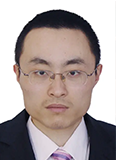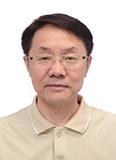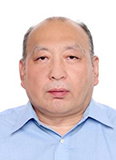

Prof. YuDong Zhang
IET/EAI/Fellow, IEEE/ACM Senior Member
Southeast University
Biography:
YudongZhang, chief professor at Southeast University, is a national high-level talent. His research interests include artificial intelligence, deep learning, and medical image processing. He is a fellow of IET/ EAI/ BCS, a senior member of IEEE and ACM, and an ACM distinguished speaker. He was recognized as a highly cited researcher by Clarivate Analytics from 2019 to 2024 and was among the top 2% of scientists in the world according to Stanford University from 2020 to 2023. He received the Emerald Citation of Excellence award in 2017 and the Best Paper Award at the Information Fusion in 2022, among others. Three of his papers were included in the UK's Research Excellence Framework 2021.
Speech Title: Precision Diagnosis of Colorectal Lesions via Integrated AI
Abstract: This report focuses on constructing an integrated system through the integration of multi-dimensional technologies such as artificial intelligence, image analysis, and clinical data processing to achieve accurate identification and in-depth diagnosis of colorectal lesions. Breaking through the limitations of scattered image interpretation and single-dimensional analysis in traditional diagnosis, this technical system leverages intelligent algorithms for integrated processing of colonoscopy images, pathological features, and other information. It not only efficiently identifies subtle characteristics of early colorectal lesions but also conducts in-depth analysis in combination with clinical indicators, providing comprehensive evidence for judging lesion nature, staging evaluation, and other purposes. Its core value lies in improving diagnostic efficiency and accuracy, assisting clinicians in quickly locating lesions and formulating precise diagnosis and treatment plans. Particularly, it demonstrates significant advantages in early screening and diagnosis of complex cases, laying a technical foundation for the early detection and intervention of colorectal diseases.

Prof. Lin Wang
Xiamen University, China
Biography:
Lin Wang (Senior Member, IEEE) received the Ph.D. degree in electronics engineering from the University of Electronic Science and Technology of China, Chengdu, China, in 2001. From 1984 to 1986, he was a Teaching Assistant with the Mathematics Department, Chongqing Normal University. From 1989 to 2002, he was a Teaching Assistant, a Lecturer, and then an Associate Professor in applied mathematics and communication engineering with Chongqing University of Post and Telecommunication, Chongqing, China. From 1995 to 1996, he spent one year with the Mathematics Department, University of New England, Armidale, NSW, Australia. In 2003, he spent three months as a Visiting Researcher with the Center for Chaos and Complexity Networks, City University of Hong Kong. In 2013, he was a Senior Visiting Researcher with the Department of Electrical and Computer Engineering (ECE), University of California at Davis, CA, USA. He was a Distinguished Professor with Xiamen University, China, from 2012 to 2017, where he has been a Full Professor with the School of Informatics, since 2003. He has authored more than 280 journal and conference papers (including 100 IEEE journal articles, four best paper awards). He holds more 20 patents in physical layer in digital communications. He has held some IEEE conferences as general chairs and TPC Chairs in his career. Meanwhile he has also delivered some Keynote Speeches in the international conferences recent several years. His current research interests include source coding/channel coding, joint source and channel coding/decoding, chaos modulation and their applications to wired/wireless communication, power line communication (PLC), and underwater acoustic communications (UAC).
Speech Title: The Progress on Unified Coding Theory Based on Protograph Codes
Abstract: As the fundamental of information processing and transmission Shannon Theory is always supporting the development of modern communication and information technology, in which including Shannon First Theorem, Shannon Second Theorem, Shannon Third Theorem as well as the auxiliary ones are just its core. Further these theorems have developed various theoretical and technical branches and their standard systems. To support the simplified, refined and intelligent progresses of communication and information technologies the horizontal and vertical integrations have appeared recently in physical layer design. In this talk new designing principle based on Shannon Theory is clarified through the protograph coding theory as basic elements and shown new dynamical development of the Coding Theory. Namely, to push hardware friendly, scalable, reconfigurable for content tasks and environments new designing principle is constructed to view Shannon Theorem System through the perspective of Unified Coding Theory. Finally, the design viewpoint is verified by the Joint Source-Channel Coding/Decoding.

Prof. Maode MA
Qatar University, China
Biography:
Prof. Maode Ma is a Fellow of IET, and received his Ph.D. degree from the Department of Computer Science at the Hong Kong University of Science and Technology in 1999. He is now a research professor in the College of Engineering at Qatar University. He has extensive research interests including network security and wireless networking. He has over 530 international academic publications including over 260 journal papers. His publication has received more than 12,600 citations in Google Scholar. Prof. Ma currently serves as the Editor-in-Chief of the International Journal of Computer and Communication Engineering and the Journal of Communications. He also serves as a Senior Editor for IEEE Communications Surveys and Tutorials, and an Associate Editor for the International Journal of Wireless Communications and Mobile Computing and the International Journal of Communication Systems. Prof. Ma is a senior member of the IEEE Communication Society and a member of ACM. Prof. Ma has been a Distinguished Lecturer for the IEEE Communication Society from 2013 to 2016 and from 2023 to 2024.
Speech Title: Security Enhancements for Industrial Internet of Things
Abstract: With the increasing demand for a digital world, the Industrial Internet of Things (IIoT) is growing rapidly across various industries. In manufacturing, particularly in Industry 4.0, the IIoT assumes a vital role. It encompasses many devices such as sensing devices, application servers, users, and authentication servers within workshop settings. The security of the IIoT is a critical issue due to wireless networks’ open and dynamic nature. Therefore, designing secure protocols among those devices is an essential aspect of IIoT security functionality and poses a significant challenge to the IIoT systems. In this talk, I would like to introduce a lightweight anonymous authentication protocol to preserve privacy for IIoT users, enabling secure IIoT communication. The protocol has been validated to demonstrate its comprehensive ability to overcome various vulnerabilities and prevent malicious attacks. Finally, the performance evaluation confirms that the proposed protocol is more effective and efficient than the existing alternatives.

Assoc. Prof. Pavel Loskot
Zhejiang University - University of Illinois Urbana-Champaign Institute, China
Biography:
Pavel Loskot joined the ZJU-UIUC Institute in January 2021 as an Associate Professor after being 14 years with Swansea University in the UK. He received his PhD degree in Wireless Communications from the University of Alberta in Canada, and the MSc and BSc degrees in Radioelectronics and Biomedical Electronics, respectively, from the Czech Technical University of Prague in the Czech Republic. In the past 25 years, he was involved in numerous collaborative research and development projects, and also held a number of paid consultancy contracts with industry. He is the Senior Member of the IEEE, Fellow of the Higher Education Academy in the UK, and the Recognized Research Supervisor of the UK Council for Graduate Education. His current research interests focus on mathematical and probabilistic modeling, statistical signal processing and classical machine learning for multi-sensor data.
Speech Title: 10 Lasting Lessons From Telecommunications Engineering
Abstract: After working in telecommunications engineering for nearly 20 years, I discovered these 10 general and long-lasting lessons about system design. 1. Diversity is the only way to reliability. 2. Complex propagation and interference can be dealt with, it is the additive noise that is an ultimate killer. 3. Complex problems and systems should be broken into pieces before bringing them back together. 4. All of a sudden, everyone became a computer scientist overnight. 5. There are fundamental limits to everything. 6. Practical solutions will eventually meet these fundamental limits. 7. Scaling up inevitably makes things distributed. 8. All transport networks have the same issues. 9. Best solutions are useless if they are not robust. 10. Complexity kills robustness.